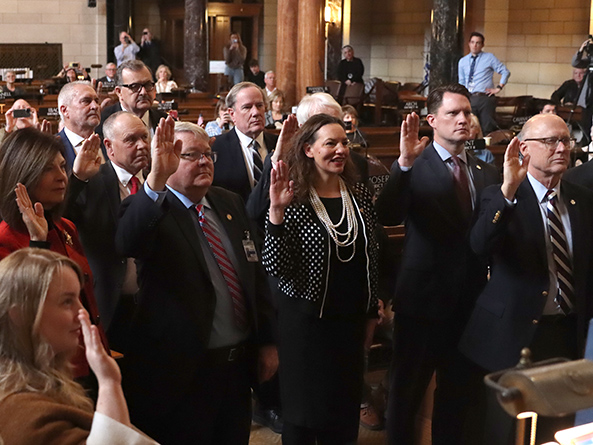Leadership positions shuffle as Legislature convenes
Twenty-six members were sworn into office Jan. 4 as the 108th Nebraska Legislature convened for its 90-day first session. That number comprises 12 re-elected senators — including two nonincumbents who are returning after previously serving in the Legislature — 13 newly elected senators and one newly appointed member.
Lawmakers also elected a new speaker and chairpersons of the Legislature’s 14 standing committees.
Senators chose La Vista Sen. John Arch to serve a two-year term as speaker of the Legislature. Arch, who was unopposed, replaces former speaker Sen. Mike Hilgers of Lincoln, who left the Legislature after being elected attorney general in November. Among other duties, the speaker prepares the Legislature’s daily agenda and serves as its presiding officer in the absence of the lieutenant governor.
Arch, former chairperson of the Health and Human Services Committee, said his experience in that capacity and as a hospital administrator demonstrates his ability to manage complex relationships and processes. He said senators need to emphasize their shared desire for positive outcomes for Nebraskans — including quality education, equal justice under the law and good stewardship of the state’s tax dollars — rather than focus on their differences.
“We have a starting point for healthy relationships if we don’t forget our agreement on the ultimate goals,” Arch said.
Several other senators also moved to new leadership positions as lawmakers elected new chairpersons to nearly all of the Legislature’s standing committees.
Glenvil Sen. Dave Murman unseated incumbent Sen. Lynne Walz of Fremont to serve as Education Committee chairperson.
Murman, elected on a 32-17 vote, said Nebraska educators need to “hammer down on the basics” and that he would be the best choice to work with Gov.-elect Jim Pillen to reform how schools are funded.
“Our state funding for education formula, TEEOSA, must be amended to support more students and more school districts than it is currently,” Murman said, adding that only approximately 35.5 percent of all Nebraska schools currently receive state aid and equalization funding.
Sen. Suzanne Geist of Lincoln prevailed in a three-way contest to chair the Transportation and Telecommunications Committee. Geist garnered 29 votes to beat out Plymouth Sen. Tom Brandt and Columbus Sen. Mike Moser for the position.
Having served for six years on the committee, four as vice chairperson, Geist pointed to her experience working closely with the state Department of Transportation and other stakeholders on broadband issues, aeronautics and innovative funding options that sped up completion of Lincoln’s South Beltway project.
“The committee handles a broad span of issues and I commit to be focused on each one of those [from] day one,” she said. “I will also continue to encourage debate and out-of-the-box thinking.”
Elected chairperson in uncontested races were: Elmwood Sen. Robert Clements to the Appropriations Committee; Dunbar Sen. Julie Slama to the Banking, Commerce and Insurance Committee; Ralston Sen. Merv Riepe to the Business and Labor Committee; Albion Sen. Tom Briese to the Executive Board; Kearney Sen. John Lowe to the General Affairs Committee; Blair Sen. Ben Hansen to the Health and Human Services Committee; Omaha Sen. Justin Wayne to the Judiciary Committee; Omaha Sen. Mike McDonnell to the Nebraska Retirement Systems Committee; and Omaha Sen. Terrell McKinney to the Urban Affairs Committee.
The chairpersons of four committees remain the same as last year, with the following lawmakers re-elected in uncontested races: Sen. Steve Halloran of Hastings to the Agriculture Committee; Sen. Tom Brewer of Gordon to the Government, Military and Veterans Affairs Committee; Sen. Bruce Bostelman of Brainard to the Natural Resources Committee; and Sen. Lou Ann Linehan of Elkhorn to the Revenue Committee.
Senators may introduce bills for the first 10 legislative days, or through Jan. 18.
The session is scheduled to last 90 legislative days, during which lawmakers will craft a two-year state budget and are expected to grapple with prison and tax reform, the state’s school funding formula and possible further restrictions on abortion.
The 2023 session is tentatively scheduled to end June 9.


